Are you ready to embark on a new adventure and add a furry friend to your life? Consider this: getting a goat is like opening a door to a whole new world of companionship and responsibility.
But before you rush into the barnyard, there are a few things you should know. From the joys of fresh milk to the challenges of housing and care, keeping goats as pets requires careful consideration.
So, grab a seat and let’s explore whether a goat is the right addition to your family.
Goats As Pets…
- Goats are low maintenance animals that are cost-effective to feed and provide a source of fresh milk.
- Before getting a goat, consider the potential property damage, noise, and odor associated with them, as well as the legal responsibilities and regulations.
- Pygmy and Nigerian Dwarf goats are suitable breeds for pets as they are gentle, friendly, and adaptable to various living environments.
- Proper housing, space, fencing, and regular cleaning are essential for keeping pet goats, along with providing a balanced diet and regular monitoring of their health.
- Compared to other larger animals, goats are relatively low maintenance, but they will still require some of your time and attention.
Benefits of Keeping Goats as Pets
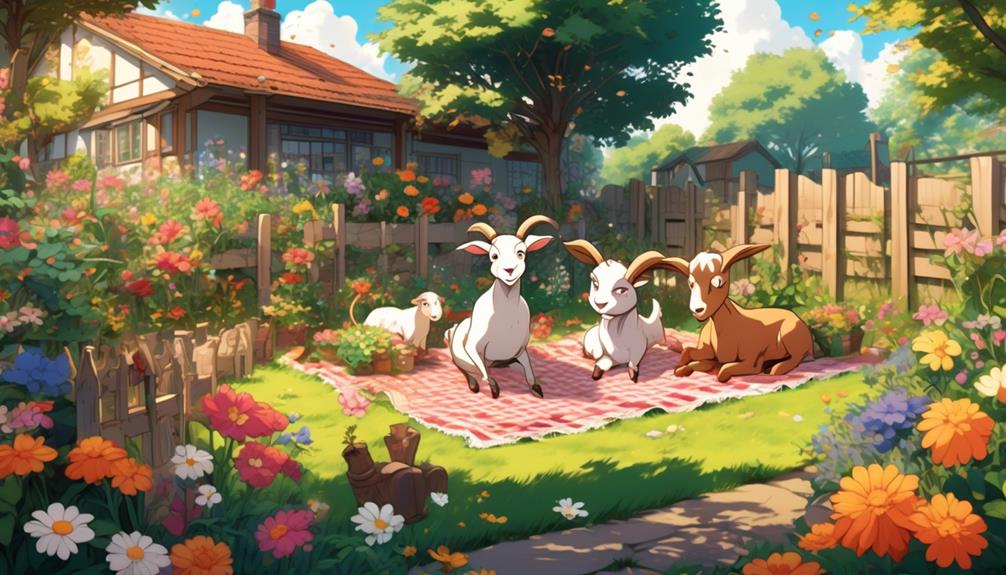
What are the benefits of keeping goats as pets? Well goats can make wonderful companions and there are many advantages to having them as pets.
Firstly, goats are low maintenance animals that are relatively easy to care for. They require minimal grooming and their diet consists mainly of grazing on grass, making them cost-effective to feed.
Secondly, keeping goats as pets can provide you with a source of fresh milk. Goat’s milk is highly nutritious and easier to digest than cow’s milk, making it a great alternative for those with lactose intolerance.
Additionally, goats are efficient grazers and can help control weeds and maintain pastures, providing natural weed control for your property. This not only saves you time and effort but also promotes a healthier and more aesthetically pleasing environment.
Furthermore, goats have a smaller ecological footprint compared to larger livestock animals, making them a sustainable and eco-friendly choice.
Lastly, keeping goats as pets can teach responsibility to children and provide companionship. They’re known to be social animals and can offer therapeutic benefits, promoting a sense of belonging and well-being.
Overall, keeping goats as pets offers a range of benefits, making them a great addition to any household.
‘Did You Know? Goats have been domesticated for thousands of years and were one of the first animals to be used for milk, meat, and fiber production.’
Considerations Before Getting a Goat
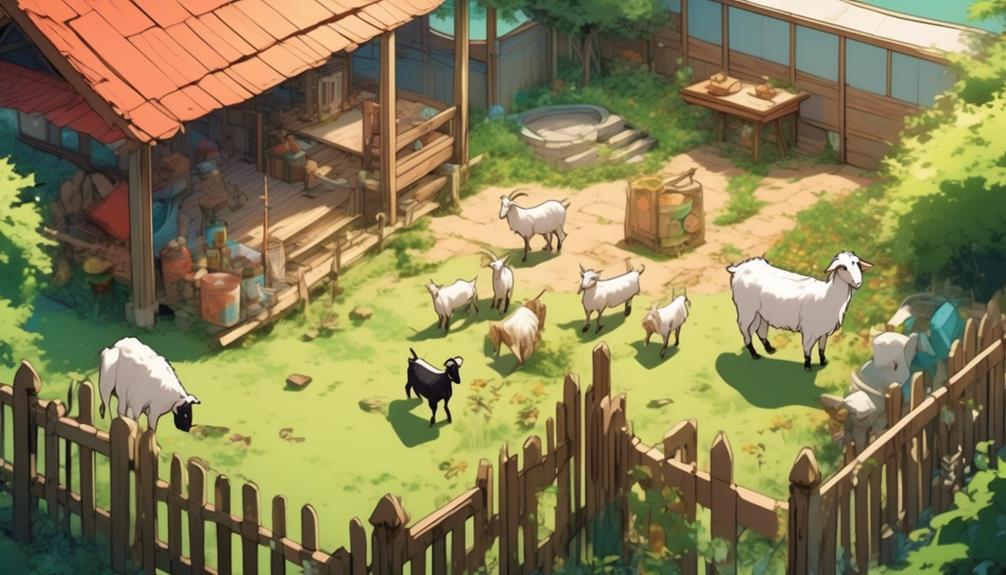
Before getting a goat, there are several important considerations to keep in mind.
While goats can make great pets, they can also be destructive to property. They have a tendency to nibble on fences, housing, and gardens, so it’s important to have sturdy structures and secure fencing in place.
Additionally, it’s worth considering the potential noise and odor associated with goats. While some people find these aspects charming, neighbors might not feel the same way. It’s important to be mindful of your neighbors’ preferences and ensure that your goats won’t cause any disturbances.
Another consideration is the breed of goat you choose.
Different goat breeds have different sizes and temperaments. If you’re considering getting a goat as a pet, it’s generally recommended to opt for smaller breeds, as they’re more manageable and require less space. Additionally, castrated males from smaller breeds tend to have better suitability as pets, as they’re less likely to exhibit aggressive behavior and have a strong smell.
Lastly, it’s crucial to understand the legal responsibilities and regulations related to keeping goats as pets in your area. Zoning laws may restrict or limit the number of goats you can have, and there may be specific guidelines regarding their care and housing. It’s important to familiarize yourself with these regulations to ensure that you’re in compliance.
Breeds Suitable for Pet Goats
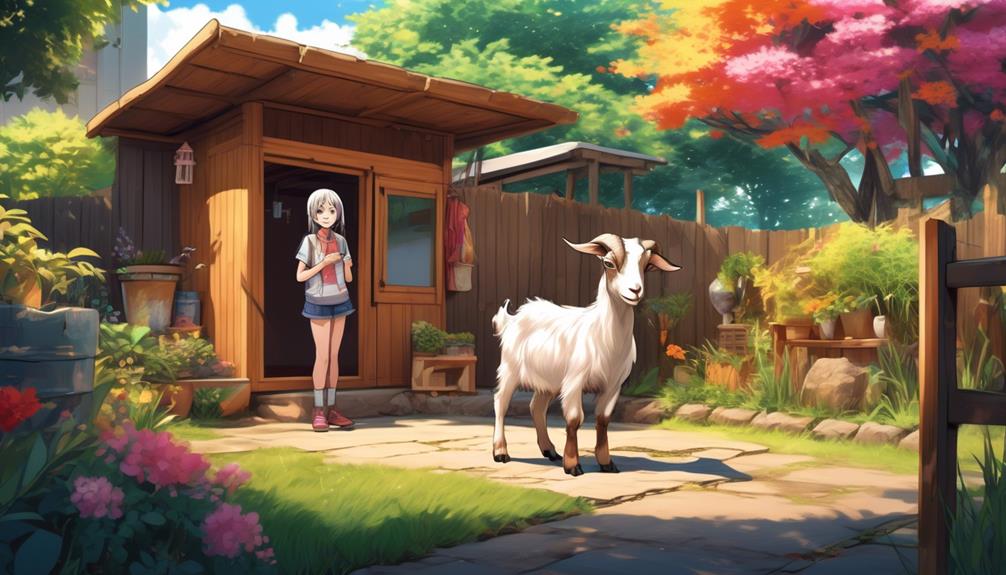
When considering breeds suitable for pet goats, it’s important to look for miniature goat breeds known for their gentle nature and adaptability. These smaller breeds, such as the Pygmy and Nigerian Dwarf, make excellent choices for goat owners seeking a loving and manageable pet.
Here are four reasons why these miniature goats are ideal for your home:
- Gentle Nature: Pygmy and Nigerian Dwarf goats are known for their docile and friendly personalities. They’re naturally sociable and enjoy human interaction, making them great companions for both adults and children.
- Adaptability: These breeds can adapt well to various living environments, including urban and suburban areas. Whether you have a small backyard or a larger property, these goats are versatile and can thrive in different climates.
- Easy to Care For: Miniature goats have simple dietary needs, primarily consisting of foraged food like grass and hay. They require minimal amounts of pellet feed or grain and access to mineral blocks for a balanced diet. Additionally, they’re generally healthy animals with low maintenance requirements.
- Exercise and Enrichment: Providing exercise and mental stimulation is crucial for the well-being of pet goats. Pygmy and Nigerian Dwarf goats can be entertained with toys, equipment, and natural materials. They enjoy climbing, jumping, and exploring their surroundings, so providing a stimulating environment will keep them happy and active.
With their gentle nature, adaptability, and easy care requirements, Pygmy and Nigerian Dwarf goats are perfect choices for goat owners seeking a loving and manageable pet. These smaller breeds will bring joy, companionship, and a sense of belonging to your home.
‘Did You Know? Goats have rectangular pupils, which give them a wide field of vision and excellent peripheral vision. This unique eye shape allows them to see predators approaching from almost any angle.’
Housing and Space Requirements
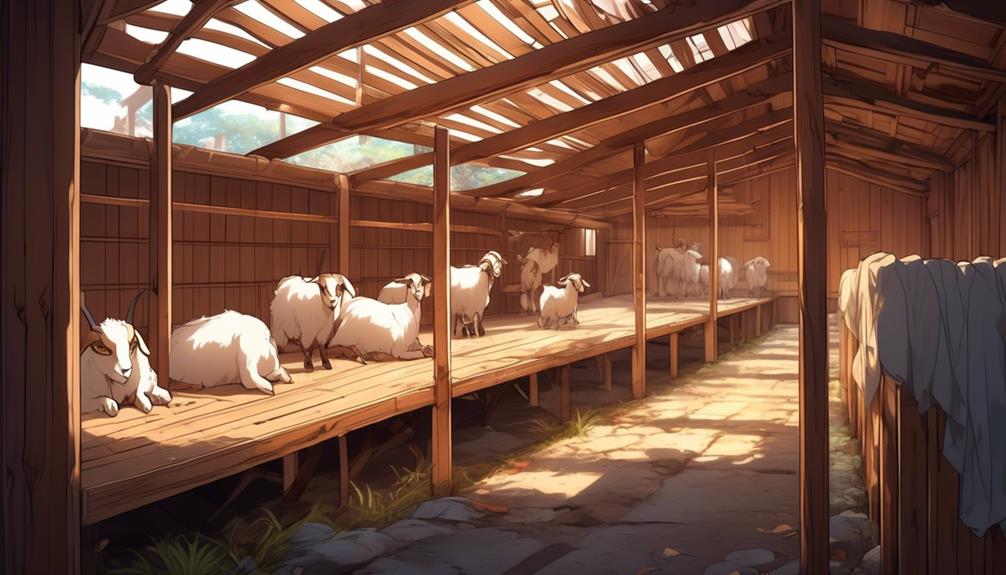
So If you’re considering bringing home miniature goats like Pygmy or Nigerian Dwarf breeds (or any other type) as a pet, it’s important to understand the housing and space requirements necessary to provide them with a secure and comfortable living environment.
Goats need plenty of room to roam and explore, as they’re herd animals that thrive in open spaces. As a general rule, you should provide at least 200 square feet of space per goat. This will allow them to exercise, graze, and socialize with other goats.
When it comes to housing, it’s crucial to provide a secure shelter for your goats. Sturdy fencing is essential to prevent escapes and ensure their safety. The fence should be at least four feet high and made of materials that goats can’t easily push through or jump over. Additionally, the living space should have proper ventilation and lighting to keep the goats comfortable and healthy.
To maintain cleanliness and organization, it’s recommended to create separate areas for feeding and sleeping. This will help prevent the goats from soiling their sleeping area and ensure a hygienic environment. Regular cleaning and maintenance of the living space is also important to prevent the buildup of waste and to promote optimal hygiene for the goats.
Feeding and Nutrition for Pet Goats

Feeding and nutrition are crucial aspects to consider when caring for pet goats, ensuring their overall health and well-being. To provide the best diet for your goats, here are four important things to keep in mind:
- Provide a balanced diet: Goats make good use of their digestive systems, so it’s important to offer them a mix of hay, grains, and fresh water. Hay should be the main component of their diet, as it provides essential fiber. Grains can be given as supplementary feed, but in moderation to prevent digestive issues.
- Consider supplements: While a balanced diet is important, it’s also a good idea to consult with a veterinarian to determine if your goats need any additional minerals or vitamins. These supplements can help ensure their optimal health and well-being.
- Avoid overfeeding: It’s important to avoid overfeeding your pet goats, as obesity can lead to various health issues. Follow feeding guidelines and monitor their weight regularly to prevent any problems.
- Provide access to grazing areas: Goats are natural foragers, so it’s beneficial to offer them access to grazing areas or pastures. This allows them to exhibit their natural behaviors and obtain additional nutrients from fresh vegetation.
Health Care and Veterinary Needs
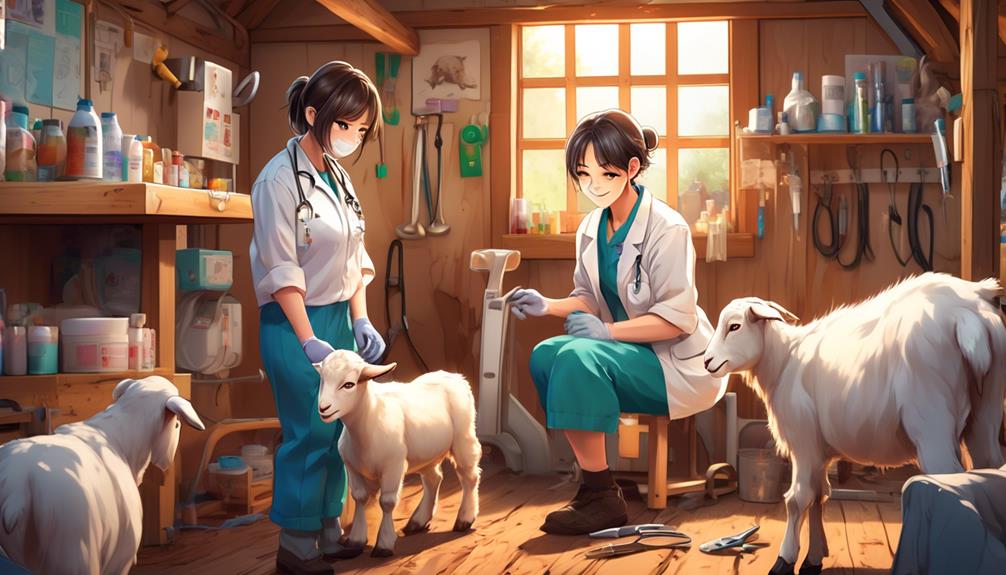
Regular veterinary check-ups are necessary to maintain the health and well-being of your pet goats. Just like any other animal, goats require proper health care and attention to ensure they live a happy and healthy life.
Vaccinations and preventive treatments are crucial for goat well-being, as they help protect against common diseases and parasites. Your veterinarian will be able to recommend the appropriate vaccines and treatments based on your goat’s specific needs.
Proper hoof care is also essential for goats, as their hooves can quickly become overgrown or develop infections. While you can learn to trim your goat’s hooves yourself, it’s recommended to seek professional assistance initially to ensure the correct technique. Regular hoof trimming will help prevent pain and discomfort for your goats.
If you notice any changes in your goat’s behavior, appetite, or overall health, it’s important to contact a vet immediately. They’ll be able to provide medical advice and determine the best course of action to address any health concerns. This is especially important for castrated males, as they may be prone to urinary calculi or other specific health issues.
Socialization and Interaction With Goats

To ensure the well-being and happiness of your pet goats, it’s essential to provide them with daily socialization and interactive experiences. Goats are social animals and thrive on companionship and interaction with both humans and other animals. Here are four important things to keep in mind when it comes to socializing and interacting with your goats:
- Regular handling and gentle petting: Spend time with your goats each day, gently petting and stroking them. This helps them become more affectionate and trusting towards you.
- Introduce goats to other animals gradually: If you have other pets, introduce them to your goats slowly and under controlled circumstances. This will help your goats have positive socialization experiences with different types of animals.
- Engage in play and exercise activities: Goats are active and playful creatures. Engaging in play and exercise activities, such as providing them with toys or taking them for walks, will help build a strong human-animal bond and keep them mentally stimulated.
- Positive reinforcement training: Use positive reinforcement training techniques to establish trust and effective communication with your pet goats. Reward them with treats or praise when they exhibit desired behavior, and redirect or discourage unwanted behavior without resorting to punishment.
‘Did You Know? Goats have been domesticated for over 10,000 years and have played a significant role in human history as a source of milk, meat, and fiber.’
Responsibilities and Time Commitment
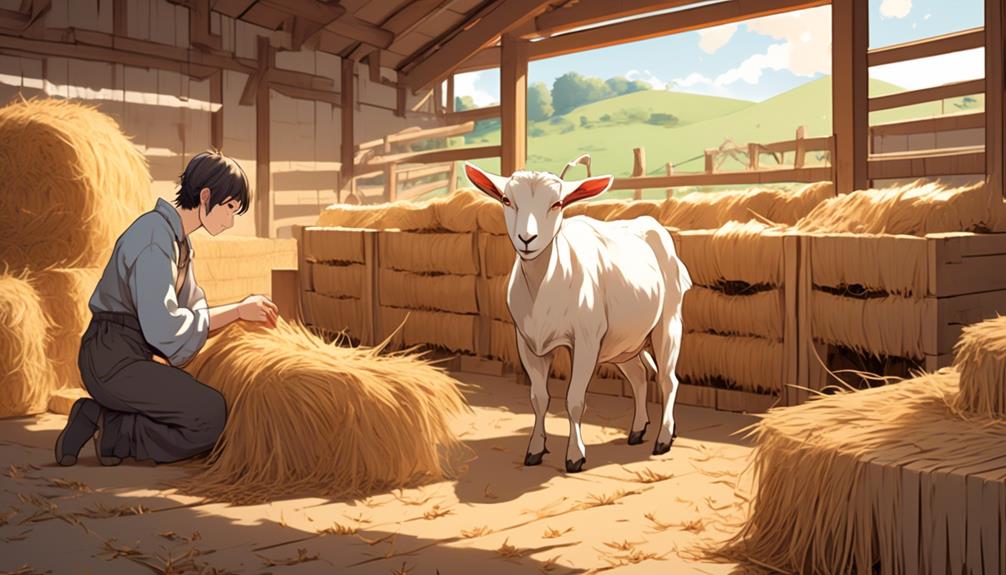
Taking care of goats requires daily attention and a commitment of time and effort to ensure their well-being and happiness.
Before bringing a goat into your life, it’s important to understand the responsibilities and time commitment involved in their care.
Let’s take a closer look at what it takes to be a responsible goat owner.
| Responsibilities | Time Commitment |
|---|---|
| Daily feeding, watering, and health monitoring | Can be time-consuming |
| Regular cleaning and maintenance of living spaces | Necessary for their well-being |
| Regular grooming | Ensures their comfort |
| Socialization and exercise | Essential for their happiness and health |
| Veterinary care, breeding considerations, and potential challenges | Time-consuming responsibilities |
When it comes to feeding and watering, goats need fresh food and water daily. This can take time, as you’ll need to provide them with a balanced diet and ensure they have access to clean water.
Additionally, goats require a clean living space and regular maintenance to prevent the buildup of waste and parasites. Grooming is also important to keep their coats healthy and free from mats.
Socialization and exercise are vital for goats’ well-being. They are social animals and require interaction with humans and other goats. Spending time with them, playing, and providing opportunities for exercise will contribute to their happiness and overall health.
It’s worth mentioning that goat ownership comes with long-term commitments and responsibilities. Veterinary care, breeding considerations, and potential challenges may require additional time and effort. Before making the decision to get a goat, make sure you are prepared for the responsibilities and time commitment involved.
‘Did You Know? Goats are known for their excellent balance and agility. They’ve the ability to climb steep cliffs and even trees!’
Time For A Pet Goat?
So, should you get a goat as a pet?
Well, while there are certainly considerations to keep in mind, the benefits can outweigh the challenges. Just imagine having a low-maintenance companion that provides fresh milk, helps with weed control, and teaches responsibility to children.
It’s like having a little eco-friendly helper right in your backyard, bringing joy and a touch of farm life to your home. So, if you’re up for the responsibilities and the rewards, why not give it a try?
More Goat Keeping Info…
Not convinced yet? Here’s a nice informative video that you might like to watch, to help you decide whether keeping a goat as a pet is right for you….
